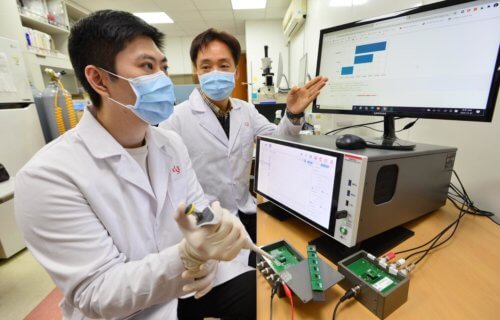SEOUL, South Korea — Screening for cancer can sometimes be a very painful and very invasive process. For men at risk of prostate cancer, a new test may change all of that and make diagnosing cancer as simple as a drug screening. Researchers at the Korea Institute of Science and Technology (KIST) say their new exam, using a urine sample and artificial intelligence (AI), can accurately screen for prostate cancer in minutes without the need of a biopsy.
Prostate cancer is one of the most common cancers among men in the world. The American Cancer Society says one in eight men will develop the disease in their lifetime. It is also the second-leading cause of cancer death among American men.
Doctors usually diagnose prostate cancer using Prostate-Specific Antigen (PSA), a cancer factor found in the blood. Unfortunately, the accuracy of testing PSA can be as low as 30 percent. This forces many patients to have an invasive biopsy to properly diagnose their condition; potentially leading side-effects such as bleeding or surgical pain.
Simplifying cancer screenings
A team led by Dr. Kwan Hyi Lee from the Biomaterials Research Center has developed a new diagnostic test which looks at cancer factors in urine and takes just 20 minutes to complete. The test combines an AI analysis method with an electrical-signal-based ultrasensitive biosensor.
Researchers say because the concentration of cancer factors are so low in urine, scientists are using the biosensor to help classify risk groups rather than make a precise diagnosis so far.
The study found trying to diagnose the disease using a single cancer factor limited the screening accuracy. To overcome this, researchers simultaneously analyzed different factors to increase the test’s accuracy.
The Korean team created an ultrasensitive semiconductor sensor system which can measure trace amounts of four cancer factors in urine at the same time. They then trained an AI program using the connections between these factors detected by the sensor. The AI algorithm could then identify patients with prostate cancer simply by examining complex patterns coming from the sensor.
The results from 76 urine samples reveal the AI analysis could successfully detect prostate cancer with almost 100 percent accuracy.
“For patients who need surgery and/or treatments, cancer will be diagnosed with high accuracy by utilizing urine to minimize unnecessary biopsy and treatments, which can dramatically reduce medical costs and medical staff’s fatigue,” Professor In Gab Jeong from Asan Medical Center says in a media release.
“This research developed a smart biosensor that can rapidly diagnose prostate cancer with almost 100 percent accuracy only through a urine test, and it can be further utilized in the precise diagnoses of other cancers using a urine test,” adds Dr. Lee.
The study appears in the journal ACS Nano.
